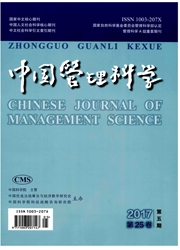

 中文摘要:
中文摘要:
基于行为人有限理性具有动机公平偏好的假设,论文定义跨国企业和东道国政府为委托代理关系,构建了企业和政府在不同引资政策下的博弈模型,探讨了跨国企业和东道国政府的演化博弈过程及其均衡点,分析了博弈双方最佳决策以及合作共赢机制。研究表明:东道国政府给予跨国企业的收入分配比越高,跨国企业越努力工作,其最优努力程度还与规制系数、风险规避程度、规模和优惠产出系数相关;东道国政府给予的收入分配比受风险规避度、产出方差和规避系数的影响;在激励与规制相结合的引资政策下,基于动机公平的博弈双方能达到演化稳定点,实现跨国企业和东道国政府合作共赢。本文将演化博弈和合作共赢纳入分析框架中进行动态分析,丰富了该领域的研究成果,为企业对外投资提供了理论依据以及政府政策制定提供了参考。
 英文摘要:
英文摘要:
The role of FDI policy of host country in MNC’s foreign investment activities is assessed in this paper.Models are developed based on the principal-agent approach to the games,and are tested on simulation results using the Latin Hyper-cube Sampling Monte Carlo Simulation method.It is found that the degree of risk aversion,scale of MNC and regulation for MNC have played important roles in MNC’s work effort.Furthermore,the more income distribution MNC gets,the harder work MNC will try.In addition,under the policy of combined stimulation with regulation,it is proved that MSC and host country can both achieve mutual benefits and win-win corporation mechanism when they considering fairness and reciprocal.The results not only disentangle the effects of FDI policy in decisions and utility by model,but also provide the new approach to achieve the win-win mechanism.Some important guidance for MNC from China and policy-making are affered in this study.
 同期刊论文项目
同期刊论文项目
 同项目期刊论文
同项目期刊论文
 期刊信息
期刊信息
